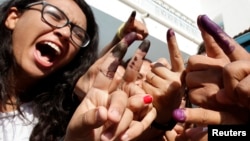Tunisians are voting Sunday to elect their first full parliament under a new constitution.
Two key parties are expected to score well: the moderate Islamist Ennahda party, which won Tunisia's last election, and the new liberal Nidaa Tounes party.
Sunday's vote dominated Tunisia's airwaves as voters lined up early in the morning to cast their ballots. This is the second legislative vote the country has held since its landmark revolution three years ago - and the first under its new constitution.
'Historic' elections
Rachid Ghannouchi, who heads Ennahda, described Sunday's elections as "historic" and "a day where the dreams of generations of martyrs, prisoners and displaced people come true."
"It is our duty as Tunisians to keep this candle burning, to light the way forward for the Arab world," Ghannouchi said.
"We need to to keep it burning to prove that dreams can come true and that the Arab people are worthy of democracy; that Islam and democracy are not contradictory, but go hand in hand, and that the Tunisian people are civilized, and worthy of democracy themselves. It is a big responsibility for the next generation," Channouchi said.
Tunis resident Mariam Touati waited in line for her turn at a polling station in the old Medina area.
Touati said she supported programs targeting youth. She's tired of the old politicians who did't represent people's expectations. What's key, she said, were realistic political programs emphasizing education and economic development - and not just idle talk.
Voter Iheb Attia hoped the elections would achieve a national consensus so Tunisia could move forward to achieve prosperity.
Dozens of parties and hundreds of candidates are running for a place in the 217-seat parliament. With radical groups threatening to disrupt the vote, security was reinforced in many places. Hundreds of national and international monitors were at hand to ensure a free and fair vote.
The moderate Islamist Ennahda party is considered a front runner - although it's expected to score less strongly than three years ago, when it won the last legislative elections. Its main opponent is expected to be Nidaa Tounes - a new secular alliance that includes members of the former regime.
Birthplace of Arab Spring
Tunisia is considered the birthplace of the so-called Arab Spring, and still a rare success story in a region where other uprisings have exploded into violence.
Tunisia was the first North African country to topple its government in a popular uprising in 2010 and has been relatively peaceful since.
The revolt ousted veteran autocrat Zine El Abidine Ben Ali and ushered in a coalition government and interim president that has won praise from the international community.
But Tunisia analyst Anthony Dworkin, of the European Council on Foreign Relations, said the North African country remained more of a symbol than a model for the Arab world.
"I think it would be an illusion to think the Tunisia example is going to quickly bring other countries in the region along with it. I think Tunisia, at this point, looks like an exception for all sorts of reasons," Dworkin said.
Still, Tunisia's democracy remains fragile and its economy is struggling. Jobs, economic growth and security are top priorities for many voters.
Election results are expected to be announced on Wednesday.




